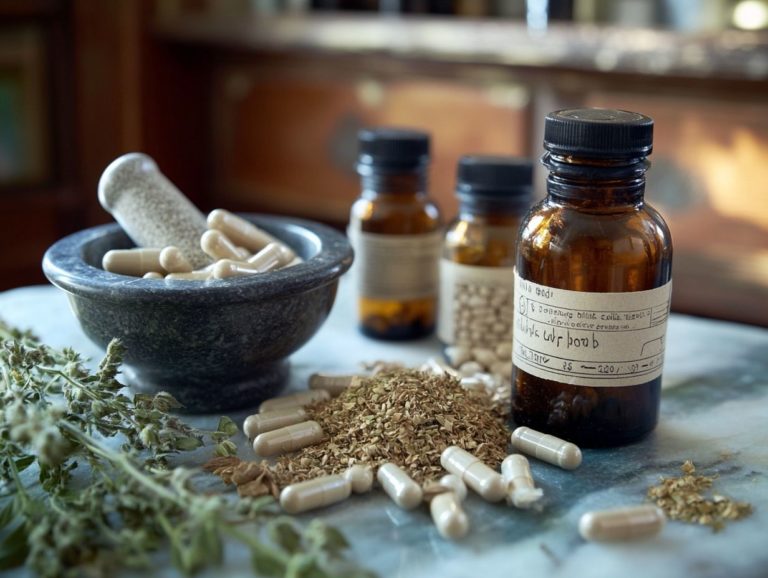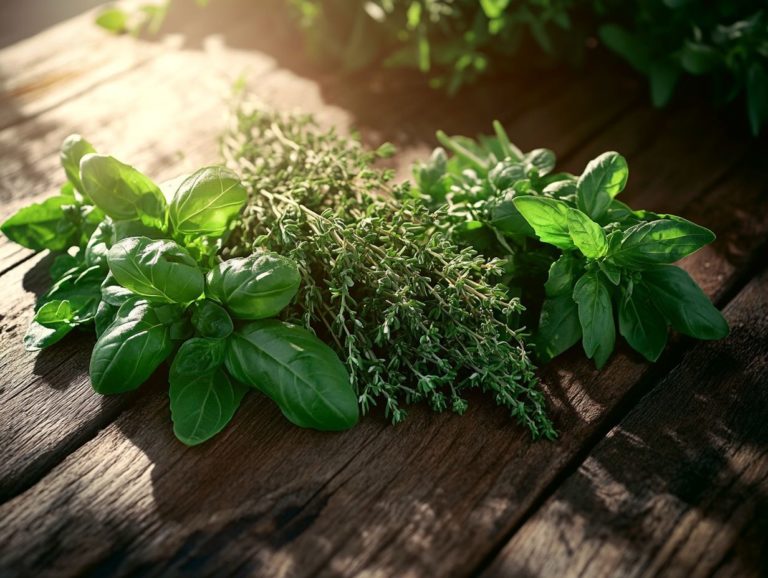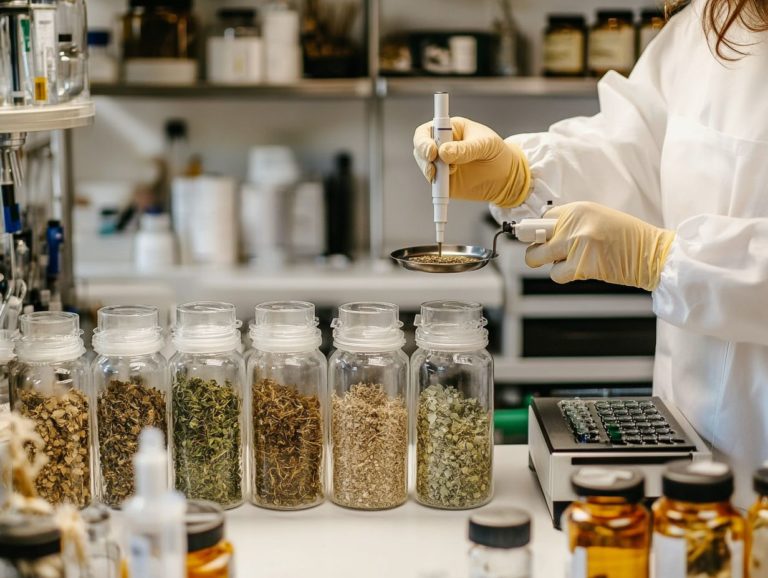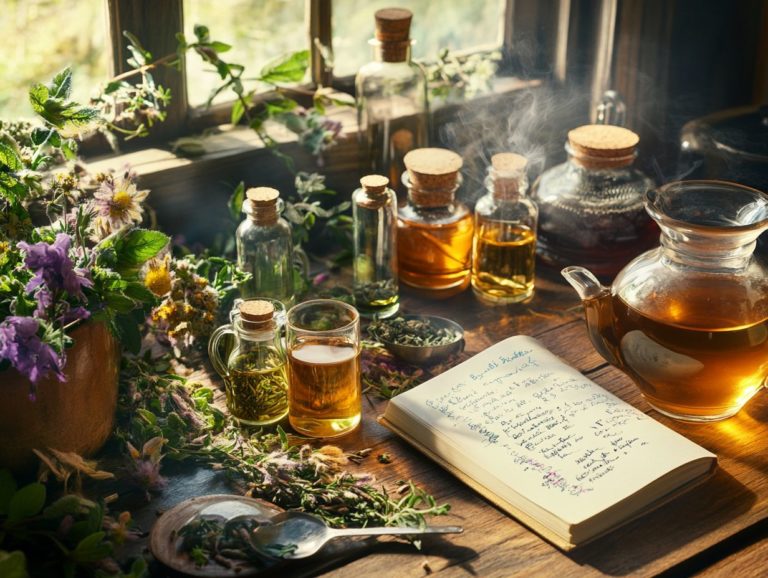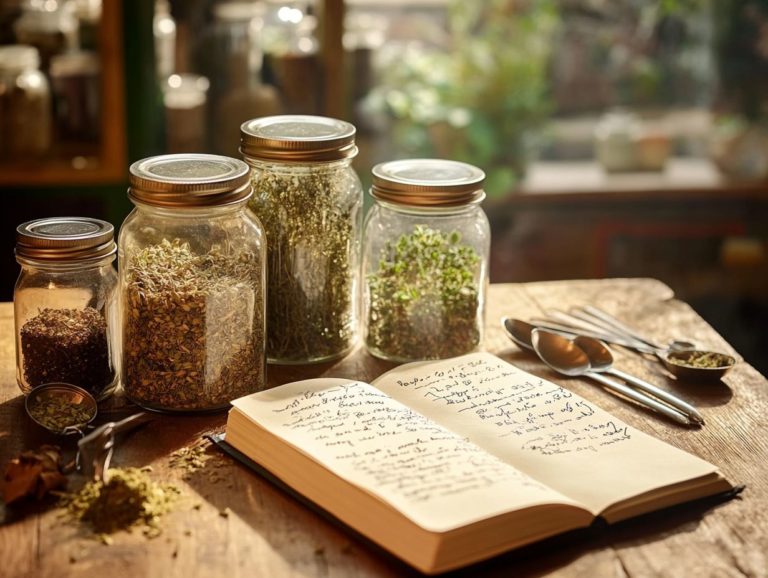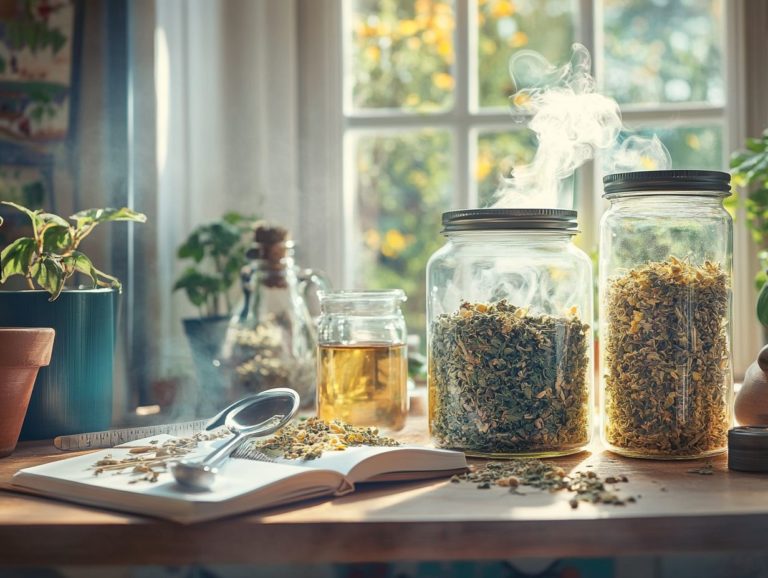Herbs That Interact: Dosage Precautions
Herbs can be powerful allies in promoting health, yet they come with their own complexities. It s essential to understand how herbs interact both with one another and with medications for safe and effective use.
This article delves into the intricacies of herb interactions, highlighting common herbs that may pose certain risks. Discover crucial precautions, dosage guidelines, and potential side effects to consider.
You ll find valuable tips to avoid negative interactions and know when to consult a healthcare professional. Immerse yourself in this information to ensure your herbal journey is both safe and beneficial!
Contents
- Key Takeaways:
- Understanding Herb Interactions
- Common Herbs and Their Interactions
- Precautions When Taking Herbs
- How to Avoid Negative Interactions
- Consulting with a Healthcare Professional
- Frequently Asked Questions
- What are some common herbs that interact with medications?
- Can herbs interact with prescription medications?
- What are some dosage precautions to take when using herbs?
- How can I ensure safe herb usage with my medications?
- Are there any specific precautions to take when using herbs during pregnancy or breastfeeding?
- Is it safe to use herbs with over-the-counter medications?
Key Takeaways:
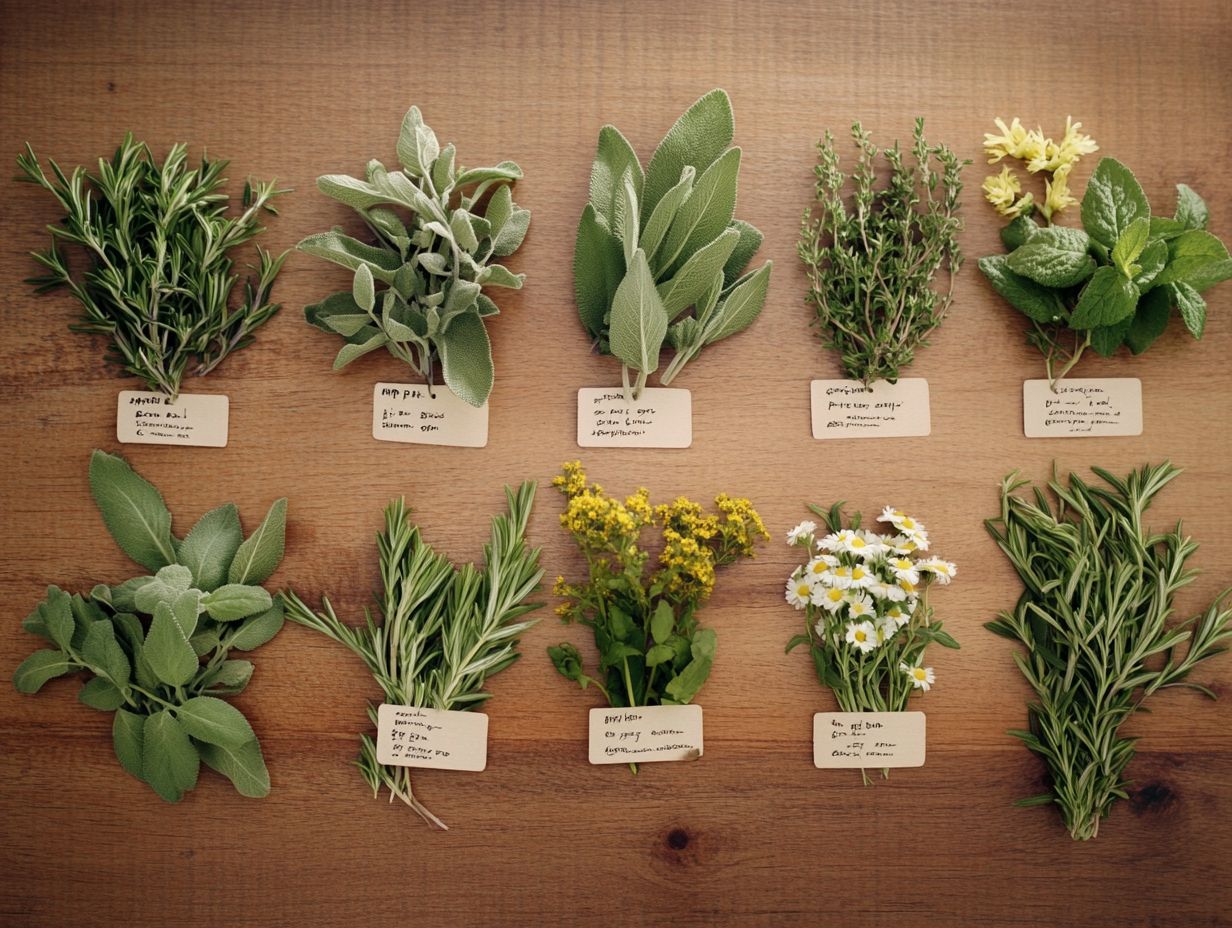
- Always research potential interactions between herbs before consuming them, as they can have adverse effects, especially concerning interactions with prescription medications and potential risks to your health.
- Dosage guidelines should be strictly followed when taking herbs to avoid potential side effects or negative interactions with other medications.
- Consulting a healthcare provider is essential. It is particularly important if you have pre-existing medical conditions or are taking other medications.
Understanding Herb Interactions
Understanding herb interactions is crucial for anyone using herbal supplements alongside prescription medications or other dietary supplements. Herbal remedies like St. John’s wort and its potential impacts and ginkgo biloba and its effects on bleeding risk, can interact with various drugs, potentially leading to adverse effects.
Interactions may influence how medications are metabolized and change how those medications work. Clinical trials have revealed varying levels of safety and efficacy, underscoring the importance of a patient-centered approach when it comes to herbal supplement use.
Consulting a healthcare provider is essential. Clinical pharmacists play a vital role in educating individuals about the complexities of these interactions, ensuring that you navigate this landscape with confidence and awareness.
What Happens When Herbs Interact?
When herbs interact with prescription medications, the results can be significant, leading to either amplified effects or unexpected reactions. Take herbal remedies like goldenseal or valerian root for sleep and relaxation; they can significantly influence how anticoagulants such as warfarin work.
These interactions primarily take shape through how the body handles medications and how they affect your body. Garlic, for example, might ramp up the metabolism of warfarin, potentially reducing its blood-thinning capabilities. On the flip side, curcumin can boost how well the body uses certain medications by inhibiting specific enzymes.
Numerous clinical trials are essential to understanding these effects and have shed light on these intricate interactions. This underscores the importance for healthcare providers to meticulously monitor anyone using both herbal supplements and prescription medications, avoiding common herbal dosage mistakes to ensure safety and effectiveness in patient care.
Common Herbs and Their Interactions
Common herbs like echinacea, kava kava for anxiety management, and milk thistle’s role in liver health are celebrated for their benefits, yet they also carry the potential for drug interactions that require careful consideration.
It’s crucial for you to understand these interactions to ensure safe consumption, particularly if you are a U.S. adult using herbal supplements in conjunction with prescription medications. Familiarizing yourself with creating herbal remedies: safety tips is essential. Knowledge is your best ally in navigating these complexities.
Examples of Herbs that Interact
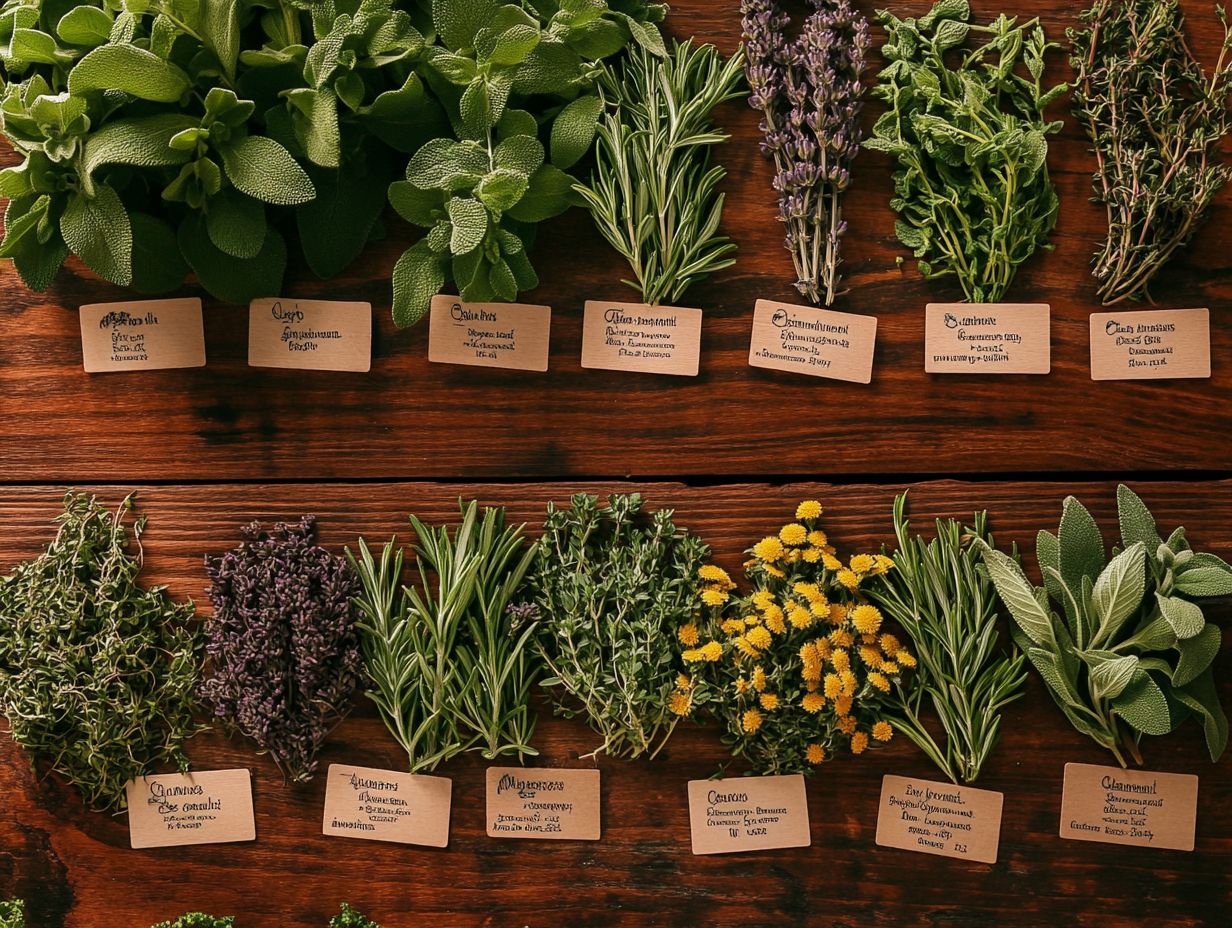
Several popular herbs have documented interactions with prescription medications, making it essential for you to stay informed. St. John’s wort can reduce the effectiveness of birth control pills, while ginkgo biloba can increase the risk of bleeding when combined with anticoagulants.
American ginseng can lower blood sugar levels, which may influence diabetes management when taken alongside insulin or other glucose-lowering medications. The risk of adverse outcomes underscores the importance of disclosing all herbal supplements to your healthcare provider.
If you regularly seek herbalist services, it s crucial to engage in open discussions about your use of these natural remedies.
As alternative medicine grows, awareness of possible drug interactions and their clinical implications is vital for ensuring safe and effective health management.
Precautions When Taking Herbs
When contemplating the use of herbal supplements, grasping the necessary precautions for safe consumption is crucial. Many herbs, including black cohosh and echinacea, demand careful consideration regarding dosage guidelines.
This attention is vital to mitigate potential side effects and to guarantee the safety of the herbal products you choose.
Dosage Guidelines and Possible Side Effects
Adhering to proper dosage guidelines is essential when taking herbal supplements. Exceeding those recommended amounts can lead to serious side effects.
Consult with healthcare providers to ensure your herbal use is tailored to your needs, prioritizing safety. Different herbs, such as echinacea or ginseng, have specific dosage recommendations designed to maximize benefits while minimizing potential adverse effects. For detailed information, refer to herbal remedies: safe dosage for adults and children.
For instance, studies suggest that taking 300-500 mg of echinacea three times daily may support your immune health. However, be cautious high doses could potentially lead to skin rashes or gastrointestinal upset.
Similarly, ginseng is often recommended at a daily dose of 200-400 mg, but overconsumption might result in headaches or sleep disturbances.
To ensure safe application and navigate the complexities of herbal use, strongly consider referencing clinical trial data and discussing your choices with healthcare professionals. Additionally, you may find it helpful to consult balancing herbal remedies: dosage guidelines for more insights.
How to Avoid Negative Interactions
To navigate the complex landscape of herbs and medications, it is essential to take a proactive stance. This includes conducting quality testing of herbal supplements and engaging in comprehensive research on potential drug interactions.
By prioritizing the safety of herbal supplements, you can significantly minimize the risk of adverse effects and ensure a more harmonious relationship between your health choices, especially by following herbal remedies dosage tips for older adults.
Tips for Safe Herb Consumption
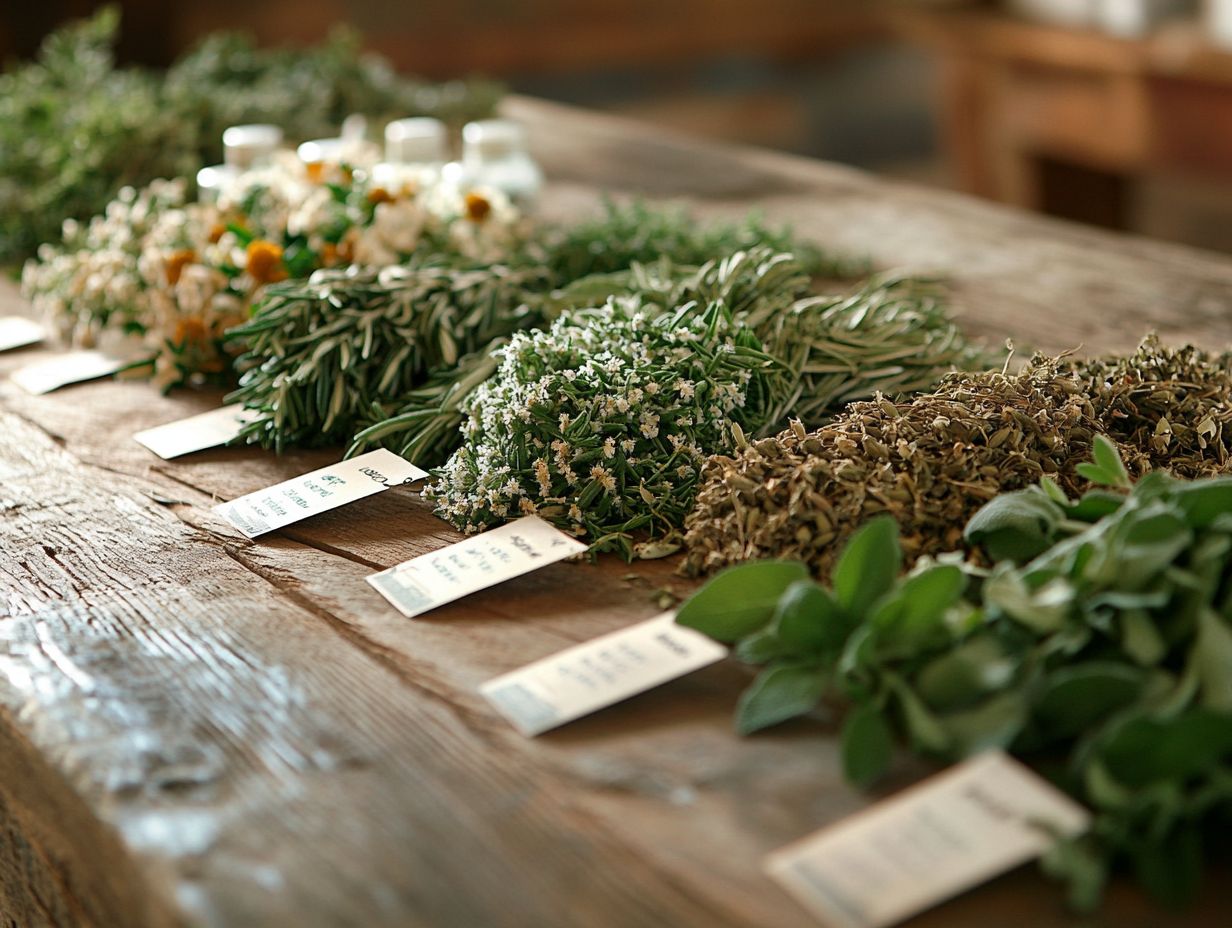
To ensure your herb consumption is safe, prioritize open communication with your healthcare providers, especially when considering different herbal supplement combinations. Relying on trusted resources like consumerlab.com can provide valuable insights.
Discuss all supplements and medications you re currently using. Some herbs can interact with prescription drugs, leading to unwanted effects.
Research the origins and manufacturing practices of herbal products for valuable insight into their quality and safety. Additionally, seek guidance from healthcare professionals well-versed in herbal remedies to navigate safe usage effectively.
Stay abreast of the latest studies and reviews on herbal supplements to make educated decisions, allowing you to enjoy the benefits of these natural remedies without compromising your health.
Consulting with a Healthcare Professional
Consulting with a healthcare professional is essential for anyone contemplating herbal medicine or dietary supplements. It’s vital to know how these supplements might affect your health.
By cultivating a trusting relationship with your healthcare provider, you pave the way for a patient-centered approach to your overall wellness.
When to Seek Professional Advice
You should always seek professional advice from a healthcare provider whenever you experience adverse effects from herbal supplements or have long-term health issues that might complicate your use of dietary supplements.
If you’re managing conditions like diabetes or heart disease, it’s crucial to exercise caution when considering additional herbal remedies. To ensure safe usage, refer to understanding herbal dosage, as some supplements can cause problems with your prescribed medications, leading to unintended side effects or diminishing the effectiveness of your treatment.
Healthcare providers play an essential role in guiding you through the vast array of options available. They ensure that any herbal remedy you consider is not only safe but also complements your existing medical interventions.
Understanding how each supplement interacts is vital for maintaining your overall health and well-being, especially if you re taking multiple supplements.
Frequently Asked Questions
Below are some common questions regarding the use of herbs and their interactions with medications.
What are some common herbs that interact with medications?
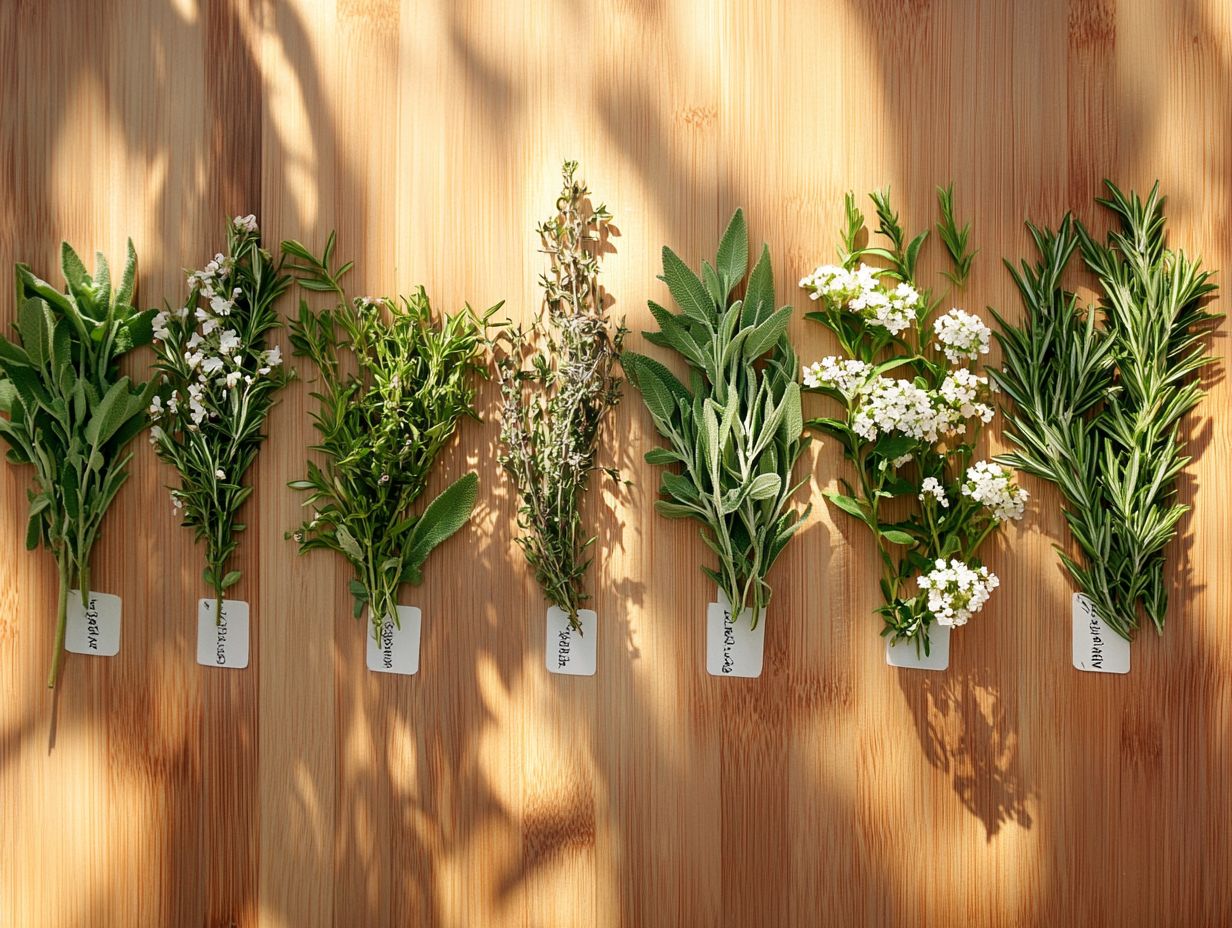
Some common herbs that interact with medications include:
- St. John’s Wort
- Ginkgo biloba
- Garlic
- Echinacea
- American ginseng
Can herbs interact with prescription medications?
Yes, herbs can interact with prescription medications, potentially causing harmful side effects or reducing the effectiveness of the medication, especially regarding drug interactions such as warfarin interactions.
What are some dosage precautions to take when using herbs?
When using herbs, particularly herbal supplements, it is important to follow recommended dosage instructions carefully. Some herbs may be toxic in high doses or when taken for an extended period of time, especially those like kava kava and black cohosh.
How can I ensure safe herb usage with my medications?
To ensure safe herb usage with your medications and maximize immune system support, always consult with your healthcare provider before starting any new herbal supplements. They can advise you on potential interactions and appropriate dosage.
Are there any specific precautions to take when using herbs during pregnancy or breastfeeding?
Yes, pregnant or breastfeeding women should exercise caution when using herbs, such as milk thistle and valerian root, and should consult with their healthcare provider before starting any new supplements.
Is it safe to use herbs with over-the-counter medications?
In general, it is best to consult with your healthcare provider before using herbs, including herbal remedies like green tea extract and curcumin, with over-the-counter medications to ensure there are no potential interactions that could cause harm.
If you have more questions or need personalized advice, don’t hesitate to reach out to your healthcare provider!

